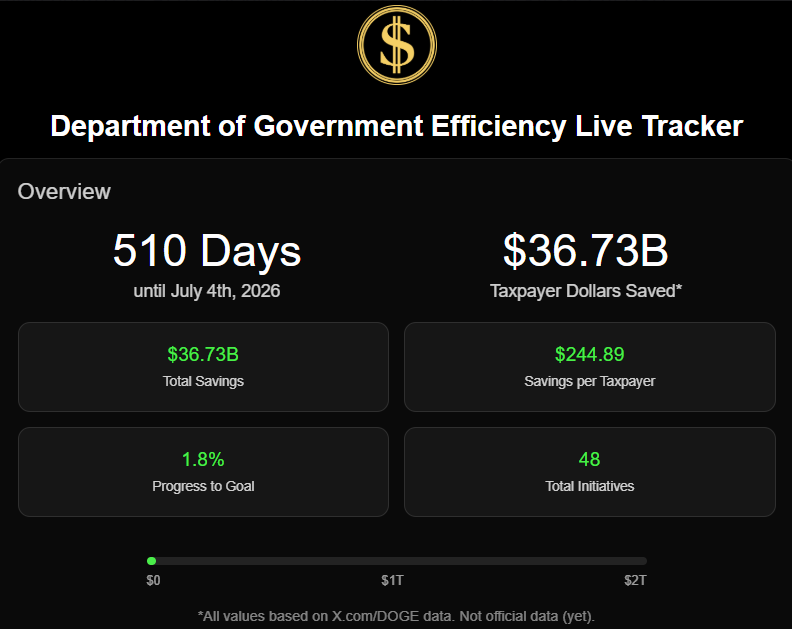Coinbase CEO Urges U.S. Treasury to Adopt Blockchain
Coinbase CEO has called on the U.S. Treasury Department to adopt blockchain technology to enhance transparency, reduce fraud, and optimize financial efficiency. He emphasized that this technology could improve budget management and increase trust in the financial system.
CRYPTO-NEWS
2/11/20252 min read


The Department of Government Efficiency (D.O.G.E) has saved U.S. taxpayers $36.7 billion, prompting industry leaders in crypto to advocate for greater transparency in government spending through blockchain technology.
According to data from Doge-tracker, this savings only accounts for 1.8% of Musk’s goal to cut U.S. government spending by up to $2 trillion.
Praise for Musk’s Agency
Brian Armstrong, co-founder and CEO of Coinbase, took to social media to call for increased transparency in government spending, praising the progress of the agency led by Musk.
A decentralized blockchain could provide a more transparent platform for financial systems since blockchain ledgers can be publicly verified in real time by anyone with an internet connection.
A potential blockchain-based treasury could also enforce mandatory spending proposals, allowing transactions only if a majority of the population votes to approve them.
$100 Billion Spending Gap Discovered by D.O.G.E
Musk’s non-governmental agency and the U.S. Treasury Department have reached a new agreement after discovering a $100 billion annual gap in government spending.
It is estimated that around $100 billion in annual entitlement payments go to individuals without a Social Security number or temporary identification number. If proven accurate, Musk called this “highly suspicious” in a Twitter post on February 8, adding:
"When I asked if anyone at the Treasury had even a rough estimate of what percentage of that amount was clear and obvious fraud, the consensus in the room was about half—that’s $50 billion per year or $1 billion per week! This is completely insane and must be addressed immediately."
One of the first proposed measures would require all government payments to include a payment classification code, which is “often left blank, making audits nearly impossible.”
Payments would also need to include a “reason,” which was previously omitted, while Musk also pushed for updating the "no-pay list of entities" on a weekly or daily basis instead of the current annual updates.
The Influence of D.O.G.E
Musk’s proposal to transition the U.S. Treasury to blockchain could make the U.S. a “global leader in blockchain innovation,” according to Jean Rausis, co-founder of the decentralized finance platform Smardex.
He told Cointelegraph: "While it’s difficult to determine which blockchain would be suitable for this task, the key is that it must be permissionless. Otherwise, the promised transparency will only be an illusion. But if the U.S. Treasury embraces decentralized infrastructure, this could be the catalyst for web2 and web3 worlds to start merging."
Musk’s agency has saved taxpayers $36 billion in less than three weeks since the official launch of the D.O.G.E website on January 21, according to Cointelegraph.
D.O.G.E’s work is expected to conclude on July 4, 2026, with the goal of a “smaller, more efficient government with less bureaucracy.” A new plan is set to be introduced on the 250th anniversary of the U.S. Declaration of Independence.



